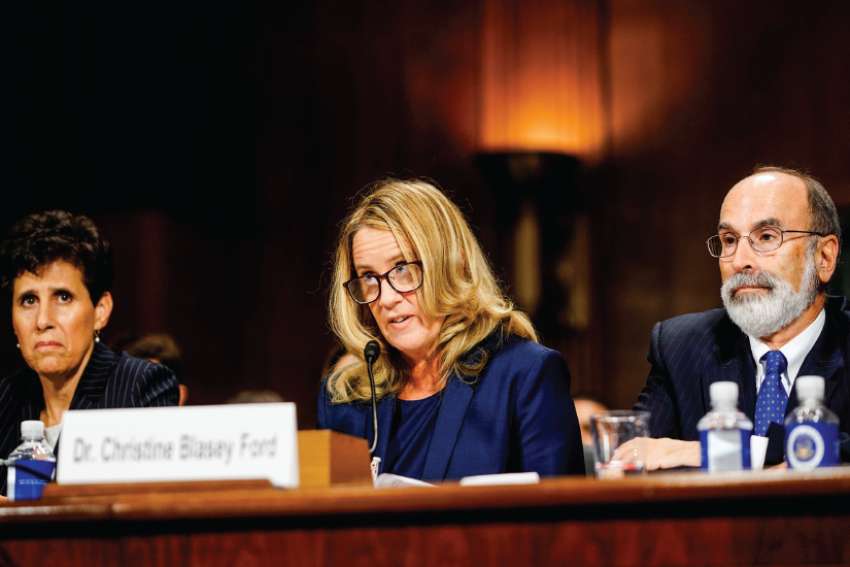Nevertheless, I accept that it is likely true that some, perhaps many, have left. I do know Catholics who walked away from regular church attendance, at least for a time, because of the Church’s treatment of women, perceived injustices experienced while working for the Church and anger over the closing of their parish church. For the most part, these departures are not the result of theological concerns, but rather with actions by those in positions of Church leadership.
In the light of these defections, I find it remarkable that, following U.S. President Donald Trump’s mockery of the testimony of purported sexual assault victim Christine Blasey Ford, there has been no suggestion of outraged Americans renouncing their U.S. citizenship. Indeed, the question of potential departures due to Trump’s harshly and deservedly criticized remarks has not even been raised.
Why would Americans reject their country because its leader trash-talked an apparent victim of sexual assault? Their allegiance to their nation goes deeper than their fidelity to the man who leads it.
One must ask then, why does the same principle not apply to the Catholic community? Why do people feel obliged to leave the Church because of the despicable actions of her leaders? Is allegiance to our nation greater than allegiance to God and God’s Church?
In fact, in almost all cases, it is. People who would never consider renouncing their citizenship do, it seems, feel free to walk away from the house of God. Our allegiance to the kingdoms of man is greater than our devotion to the reign of God.
This is precisely the misplaced commitment that Jesus challenged during His public ministry and for which He paid the ultimate price. Humans have a deeper tie to the community which they can see, hear and touch than to their bond with the God who is beyond all knowing. It seems we are not so different than those who put Jesus to death.
One source of this is the privatization of religion. Rendering unto Caesar has come to mean that worldly concerns eat the main course of the banquet of our lives, while Jesus gets the leftovers. Religion gets stuck in a small corner, never being allowed to touch the great movements of our lives and of history.
Yet, if we truly understood what God is — that God is — that He is the ultimate ground of all that exists, that He is the core of why I and everyone else lives and breathes, then we would constantly seek the eternal in every pebble, leaf and human emotion. That we don’t is the clearest sign that our eyes are glued to appearances rather than to reality.
Jesus opened the eyes of the man born blind (John 9). But instead of inspiring faith and new vision in the man’s family and among the religious leaders, the miracle brought recriminations and fear. A vision of reality led to acrimony and division, rather than peace and harmony. After the formerly blind man proclaimed his faith, Jesus told him, “I came into this world for judgment so that those who do not see may see, and those who do see may become blind” (9.39).
Would that all receive and accept the gift of a vision of reality as did the man born blind. Would that all see the divine reality hidden behind the thin veil of things and events.
If that were so, we would understand tribes and nations as arbitrary constructs, and our allegiance to them would be conditional. As well, we would see God’s reign as the true reality, a hidden reality, but also the ultimate one. On one hand, our allegiance to the sacramental community that is our source of vision would never be in doubt. On the other, we would see that all human organizations are coloured by greed and the quest for power.
Have no faith in Herod and his minions. Accept, instead, the divine vision which Jesus gives through His Church. Only there can be found the gifts of life and light.
(Argan is a freelance editor and writer who lives in Edmonton.)


